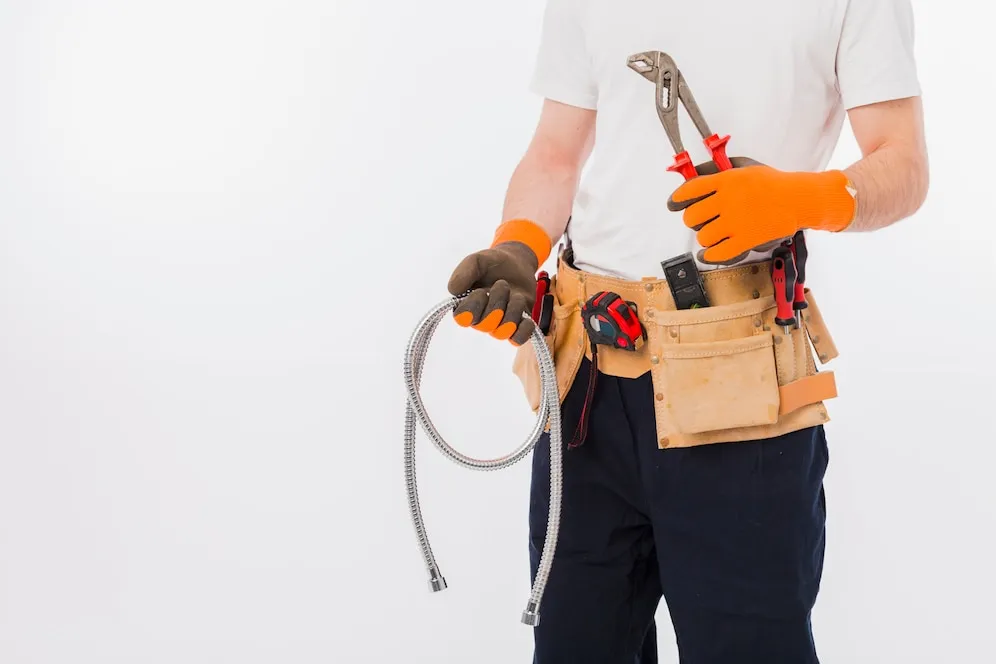If you’ve ever wondered how much a plumber makes, you’re not alone. Plumbing is one of the most respected skilled trades, and for good reason.
It offers stability, a clear career path, and solid pay. Whether you’re considering entering the trade or looking to hire a plumber, understanding how plumber salaries work can help you make informed decisions.
In this guide, learn how much does a plumber make per hour and annually.
Let’s start with the basics: how much does a plumber make per hour? Plumbers in the U.S. earn an average of $30.39 per hour. However, this can go as high as $45–$60/hour in places like California, New York, or Massachusetts, especially for licensed master plumbers.
Journeyman plumbers—those who have completed their apprenticeships—typically fall in the middle range. Apprentices usually earn $20.60 per hour, while more experienced or specialized plumbers can command significantly higher wages.
Hourly wages can also be affected by the type of job—emergency plumbing work or commercial projects often pay more than routine residential services.
So, really, how much does a plumber make annually? It is noted that most plumbers earn between $55K-$99K/year.
Master plumbers or those running their own businesses can make upwards of $80,053/year. Some highly experienced professionals in urban areas or in high-risk plumbing specialties even cross the six-figure threshold.
For comparison:
- The bottom 10% of plumbers make around $32,690 ($15.72 per hour)
- The top 10% earn $97,170 ($46.72 per hour).
Here are the details of Plumbers’ salary across the U.S. Here’s a breakdown of what plumbers earn in different states:
| State | Annual Salary | Hourly wage |
| Florida | $43,539 | $20.93 |
| California | $59,358 | $28.54 |
| New York | $64,056 | $30.80 |
| Texas | $56,370 | $27.10 |
High-cost-of-living states generally pay more, while states with fewer licensing requirements may offer lower rates. Licensing laws, labor demand, and union presence all influence regional earnings.
Your level of experience is one of the most important factors in determining how much a plumber make.
- Apprentices are usually trainees working under supervision. They earn around $59,880 per year.
- Journeymen have completed training and are licensed to work independently. Their average salary ranges from $77,890/year.
- Master plumbers can manage teams, run businesses, and obtain high-value contracts. Their annual income typically falls between $99,920.
The more specialized or in-demand your skill set, the more you’re likely to earn, even within the same role.
Plumbing already pays well, but if you’re aiming to earn even more, there are many smart ways to grow your income. Some take time and effort, but they all help you stand out and move ahead in your career.
1. Certification Must Be a Goal
Having plumbing certifications shows that you know your work and that you’re serious about it. These certificates prove you’ve learned advanced skills, and many companies are willing to pay more for plumbers who are certified.
Some common certifications include:
- Backflow prevention
- Medical gas installation
- OSHA safety training
These extra credentials help you land better-paying jobs, especially in commercial or specialized areas.
2. Training Will Pay Plus
You don’t have to stop learning once you become a plumber. More training means more skills, and more skills usually mean more money.
You can:
- Learn on the job by watching and helping experienced plumbers
- Or attend classes at a local trade school or technical college
The more you know, the more valuable you become—whether you work for someone or start your own business.
3. Must Know About New Tools and Trends
Plumbing is changing all the time. New tools, smart systems, and eco-friendly solutions are becoming more common.
If you stay updated with the latest plumbing technology, you’ll work faster, offer better solutions to clients, and show your boss that you’re growing in your role.
You could follow plumbing blogs, attend trade shows, or join online forums where professionals share new tips.

4. Extra Skills Also Necessary
Being a great plumber is the main goal, but don’t stop there. Learning other important skills like communication, sales, or time management can really boost your income.
- Sales skills help you explain services better and upsell add-ons to clients.
- Leadership or management skills help you move into a supervisor or team lead role.
There are many free and low-cost courses online to help you build these soft skills.
5. Keep your Eyes on The Sky
Hard work never goes unnoticed. If you’re someone who’s willing to help out, learn more, and support your team, you’ll likely be the first one considered for promotions. Examples include:
- Volunteering to work extra hours when needed
- Helping a co-worker solve a tricky problem
- Taking on tasks without being asked
These small efforts show that you care, and they can make a big difference when it’s time to reward team members.
6. Get Promoted or Start Your Own Business
If you really want to increase your salary fast, there are two big moves to consider:
- Get promoted: Moving from apprentice to journeyman to master plumber leads to higher pay. Being a foreman or team leader pays even more.
- Start your own company: Owning a plumbing business means you set your own prices and keep the profits. But it also means more responsibility.
To run a successful business, you’ll need to know everything from customer service to accounting—but the reward can be huge if you’re up for the challenge.
Here are some tools and credentials that can enhance a plumber’s income:
| Tool | Purpose | Impact |
| Journeyman License | Work Independently | High |
| Master License | Lead teams, own a business | Very High |
| Backflow Cert | Specializing in safety-critical systems | Medium |
| Video Inspection Equipment | Offer pipe camera services | Medium |
Using advanced equipment (like hydro-jetters or thermal scanners) allows you to charge more for high-tech services.
Here’s how to go from average to top-tier in plumbing income:
- Get Licensed: By taking a License, you can move from apprentice to journeyman to master plumber.
- Specialize: Focus on high-demand areas like gas lines, boilers, or green plumbing.
Start Your Own Business: Self-employed plumbers earn significantly more if they manage operations efficiently. - Join a Union: This offers stable wages, benefits, and training access.
- Work Overtime or Emergencies: Many plumbers make extra money by taking on late-night or holiday calls.
- Upskill Continually: Certifications like LEED, backflow testing, or OSHA can open higher-paying opportunities.
- Relocate to High-Paying Areas: States like California, New Jersey, and Alaska pay the most.
Plumbing doesn’t cap your earnings—you do. Learn, grow, and you’ll see the results in your paycheck.
Understanding how much does a plumber make helps both aspiring tradespeople and homeowners make smarter choices. Whether you’re thinking about picking up a wrench for the first time or you’ve been in the trade for years, the path ahead is full of opportunity.
I’ve seen firsthand how this career can grow from a steady job into a thriving business. The income potential is real, but it belongs to those who show up, specialize, and stay curious. So if you’re ready to build a future with your hands and your hustle, plumbing might just be your perfect fit.
Q: What’s the difference in salary between residential and commercial plumbers?
A: Commercial plumbers usually earn more due to the complexity of work and project scale.
Q: Is plumbing a good long-term career?
A: Absolutely. Plumbing offers stability, excellent wages, and potential for self-employment.
Q: Can women become plumbers, too?
A: Yes! The industry is growing more inclusive, and female plumbers are breaking barriers and earning just as much.
Q: Do plumbers get paid weekly or monthly?
A: Most are paid weekly or bi-weekly, but it depends on your employer or if you’re self-employed.










